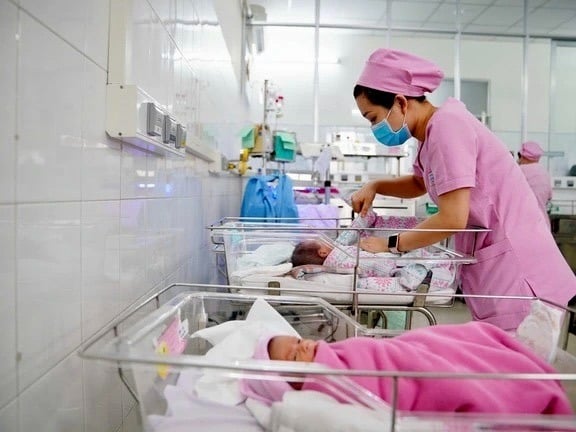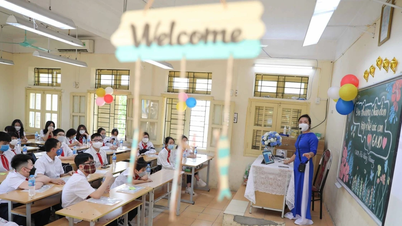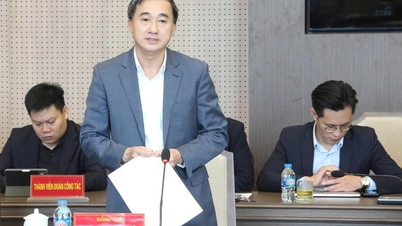The Ministry of Health has proposed allowing women who have a second child to take longer maternity leave and receive support to rent or buy social housing, especially in industrial parks, export processing zones and localities with low birth rates. This policy is expected to contribute to improving the declining birth rate in Vietnam.
 |
| The proposal aims to maintain replacement fertility levels nationwide and prevent declining fertility trends in some provinces and cities. |
Mr. Le Thanh Dung, Director of the Department of Population (Ministry of Health ), said that this agency has advised the Ministry of Health to submit to the Government a proposal to develop a Population Law and a draft Population Law, focusing on three major policy groups including maintaining replacement fertility, reducing gender imbalance at birth and improving population quality.
Regarding the group of policies to maintain fertility, the draft law stipulates that each couple and individual has equal and voluntary rights to have children, choosing the time, number of children and birth spacing appropriate to their health status, economic conditions, study and work.
A notable new point in the draft is the proposal to allow female workers giving birth to their second child to extend their maternity leave to 7 months instead of 6 months as at present.
This policy aims to create conditions for women to have more time to recover their health, take care of their children and balance family life with work. At the same time, women who give birth to two children in industrial parks, export processing zones or in provinces and cities with low birth rates will be supported to rent or buy social housing, contributing to improving living conditions and encouraging them to give birth and raise their children with peace of mind.
According to Mr. Dung, this proposal is based on Decision No. 588/QD-TTg of the Prime Minister, approving the Program to adjust birth rates to suit regions and subjects by 2030.
The program aims to maintain the replacement level of fertility nationwide and prevent the declining trend of fertility in some provinces and cities. In particular, the Government encourages men and women to marry before the age of 30, not to marry late, and women to have a second child before the age of 35.
In addition, the program also aims to create a favorable living environment for families with young children. Worker-friendly services such as childcare, babysitting, breast milk banks and family doctors will be widely developed.
Along with that is the planning and construction of childcare centers and kindergartens suitable for mothers' conditions, especially in urban areas, economic zones and industrial parks - where there is a large concentration of women of childbearing age.
In addition, the Ministry of Health also proposed comprehensive support policies for women during pregnancy and childbirth, including maternal and child health care and counseling, infertility screening, prenatal and postnatal screening, malnutrition prevention, and creating favorable conditions for women to return to work after maternity leave.
At the same time, the State will have policies to support and encourage couples to have two children, such as support for buying or renting social housing, giving priority to children studying at public schools, supporting education costs, and encouraging the development of family economic models.
According to statistics from the Ministry of Health, the fertility rate in Vietnam has been continuously decreasing in recent years, from 2.11 children per woman in 2021 to 1.96 children, and is at risk of continuing to decrease without effective interventions.
In that context, adjusting the maternity leave policy and supporting the birth of two children is not only humane, but also an important step to maintain a reasonable population structure, ensuring human resources for the country's future development.
According to current regulations of the Labor Code, female workers are entitled to 6 months of maternity leave; in case of giving birth to twins or more, they are entitled to an additional month of leave for each child, starting from the second child.
Extending the leave period to seven months for women giving birth to a second child is expected to give mothers more time to recover and care for their newborns, while also creating conditions for families to balance work and life.
The representative of the Population Department said that the 7-month level was proposed after a research process, referring to international experience and carefully considering domestic resources.
This is considered an “average” break time compared to other countries in the region and the world. The project has also been analyzed for its economic and social impacts, especially the impact on the social insurance fund, as well as opinions from businesses and employees.
According to some experts, modern women are facing a lot of pressure both at work and at home. After giving birth, they are not only physically affected but also prone to psychological problems such as depression. Therefore, increasing maternity leave is a humane measure, helping mothers have time to recover and take better care of their children, while contributing to reducing the psychological burden on women.
In addition to the maternity leave policy, the draft Population Law also proposes to give priority to families with two children to access social housing and financial support. These are practical incentives, but to achieve sustainable effectiveness, the policy needs to be implemented synchronously with solutions on employment, education, housing and childcare services.
However, there are also some concerns about “institutional and resource bottlenecks” in implementation. Accordingly, if new policies are not adjusted to be compatible with the Housing Law, the Social Insurance Law and the Labor Code, it is easy to fall into a state of “suspended policies”, meaning that there are regulations but they cannot be implemented due to lack of legal basis and budget.
To overcome this, he proposed designing a specific enforcement mechanism in the Population Law, clearly defining the coordination responsibilities between ministries and branches; and simultaneously reviewing and synchronously adjusting related laws. In addition, it is necessary to allocate resources through the national target program on population and development to ensure feasibility.
The policy should be piloted in some localities with low birth rates such as Ho Chi Minh City, Da Nang, and Thua Thien Hue for 2-3 years, then evaluated for effectiveness and replicated nationwide, to avoid waste and ensure suitability to reality.
“The Population Law will only truly come into effect when it speaks the same language as other laws and has guaranteed resources. If it only stops at commitments on paper, the birth promotion policy will forever be a good idea but will not reach the people,” one opinion stated.
Also in the morning session on October 23, after the Government submitted the draft Law on Population and the Law on Disease Prevention, the National Assembly discussed these projects in groups.
Speaking to clarify the delegates' opinions, Minister of Health Dao Hong Lan affirmed that population is an important issue that the Party and State pay attention to, clearly shown in many resolutions, especially Resolution 72-NQ/TW dated September 9, 2025 of the Politburo, which clearly states the orientation of population policy associated with sustainable development.
The Minister said that currently, population policy is mainly based on the Population Ordinance, but in the face of rapid population aging and declining birth rate, the promulgation of the Population Law is urgent to find fundamental, long-term solutions. The draft law focuses on key contents such as maintaining replacement fertility, improving population quality, reducing gender imbalance at birth and responding to population aging.
Regarding the social housing support policy, Minister Dao Hong Lan proposed adding priority groups to families with two children, or men with two children whose wives have passed away. “The goal is to help these families have more stable living conditions, so they can work and raise their children with peace of mind,” she said.
Source: https://baodautu.vn/kien-nghi-tang-thoi-gian-nghi-thai-san-cho-nguoi-sinh-con-thu-2-d420510.html




![[Photo] Opening of the 14th Conference of the 13th Party Central Committee](https://vphoto.vietnam.vn/thumb/1200x675/vietnam/resource/IMAGE/2025/11/05/1762310995216_a5-bnd-5742-5255-jpg.webp)


































![[Photo] Panorama of the Patriotic Emulation Congress of Nhan Dan Newspaper for the period 2025-2030](https://vphoto.vietnam.vn/thumb/1200x675/vietnam/resource/IMAGE/2025/11/04/1762252775462_ndo_br_dhthiduayeuncbaond-6125-jpg.webp)








































































Comment (0)